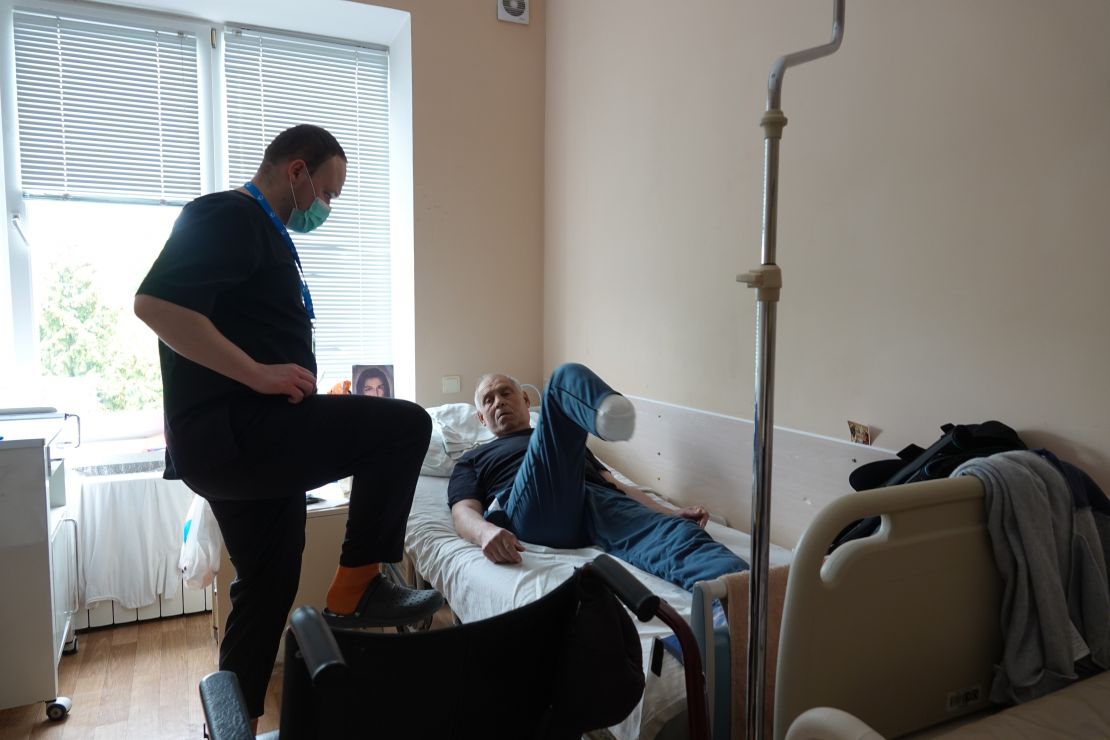Vadim recently told his story to Ruslan, Humanity & Inclusion's physical therapist who has been working with him since his operation. "The Boss," Vadim jokingly calls him.
“Thank God I’m alright! It's thanks to the medical teams. Without them, I wouldn't be here, you know. I'm so grateful to them for saving my life. I'm alive!”
Hidden away in a cellar
It's hard to put into words the hell Vadim experienced. How long did it last? Two weeks, maybe three. An eternity for Vadim. He lived hidden away in the cellar in Bakhmut, the site of a deadly battle that lasted for many months. One day, during a lull in the fighting, Vadim went out to buy food. When he returned, his house had been bombed. Where could he go? A friend advised him to hide in the basement of a building. So, Vadim found shelter in the cellar of one of the city's theaters. It was the middle of winter, with no heat or electricity. Because of the extreme cold, his legs developed severe frostbite.
Vadim was finally evacuated from Bakhmut with the help of Ukrainian volunteers. He was rushed to Lviv where he was taken to the Burn Unit of St Luke's Hospital, the reference hospital for the most serious cases.
"My legs had turned black. There was no other option. They had to amputate."
Essential rehabilitation for Vadim
 Shortly after his operation, Vadim met Ruslan, one of HI's physical therapists, who specializes in post-amputation rehabilitation.
Shortly after his operation, Vadim met Ruslan, one of HI's physical therapists, who specializes in post-amputation rehabilitation.
"We explain to patients how to take care of themselves in the future, how to do their rehabilitation exercises on their own so they can continue their treatment once they’ve left the hospital," Ruslan explains.
Vadim has to do a series of exercises to prevent numbness and to work his muscles, so they don’t contract and stiffen. He doesn’t know how long he’ll be in hospital, or where he will go afterwards.
"Who knows what's going to happen? Nobody," Vadim says. "Obviously, I'd like the war to end, but unfortunately I don't think that will happen anytime soon.”
Supporting hospitals in Ukraine
Thanks to funding from the European Union, HI has been working in 8 hospitals in the cities of Lviv, Kyiv, Kharkiv and Dnipro. In Lviv, at St Luke's Hospital, HI is training national physiotherapists to help people with severe burns, something that has never been done before in Ukraine. In Lviv, at St Luke's Hospital, HI is training national physical therapists to support people suffering from severe burns, something that has never been done before in Ukraine. Like Vadim, many of the injured are displaced people from eastern Ukraine who have been repatriated to Lviv for treatment. HI, with support from the European Union and USAID’s Bureau for Humanitarian Assistance, has also been providing direct rehabilitation services to vulnerable individuals in need.



